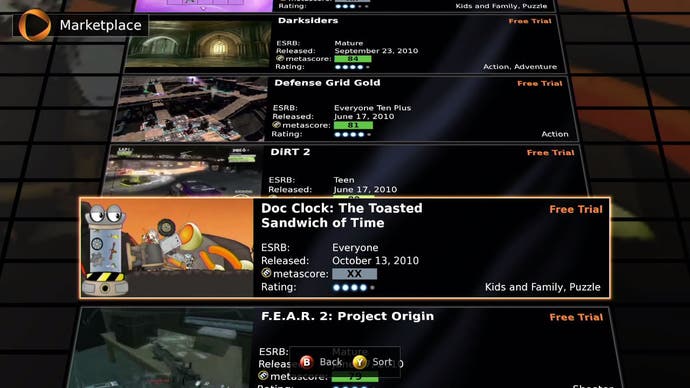OnLive
Merrily down the stream?
Playing OnLive
What can't be avoided is the question of performance, and it's here that OnLive manages to play both sides of the pitch. When it works, it's genuinely amazing. Live streaming gameplay, conjured instantly into your home by some wondrous magic. The visual quality is never going to please HD purists, but it's functional enough that you quickly stop pondering the technology and just get into the games - just as it should be.
But that's when it works, which isn't all the time. The minimum downstream required is apparently 3 Mbps, with 5 Mbps the recommended limit. I have BT Broadband, OnLive's official UK partner, and my download speed is 7.9 Mbps (the UK average is 6.8 Mbps, according to Which?). Even exceeding the requirements, my experience was variable to say the least. Catch OnLive at a good time and everything is smooth as butter, albeit with some grubby textures and a tinge of Autotune to some of the audio. Controller latency is slightly noticeable, but nothing you can't get used to. Not perfect, then - but perfectly adequate.
But then it can completely fall to pieces. Frame rates plummet, input lag skyrockets and the game comes crashing to a halt. Sometimes the cause is clear. At one point, I sent an email and was able to see the slowdown in FEAR 3 as the message chugged through the clogged data pipes. But then, moments later, I was able to play Lego Batman for an hour while my PC happily ran the BBC iPlayer, with no obvious detriment to either experience.
Indie platformer Trine ran beautifully, but Dirt 3 became a glitchy disaster within a few minutes. Deus Ex: Human Revolution was mostly fine, but Homefront was virtually uncontrollable. Try them again a few hours later, or the next day, and you'd get a completely different experience. And since everything you see on-screen is being streamed, even the dashboard can fall prey to network issues, with text prompts that might as well be hieroglyphics.

It's this inconsistency that can make OnLive so maddening. Is it a problem with the service itself? Noise on the line? A hiccup in BT's network? There's no way of knowing, but it kills the gameplay experience stone dead. If the connection is deemed too bad then OnLive simply quits, kicking you back to a menu screen while a five-minute countdown runs to see if you'll be able to carry on where you left off, or if you'll have to restart.
A quick straw poll of fellow users revealed some with lower download speeds and better experiences. Others had robust 100 Mbps connections and were plagued with problems. Given such a range of experiences, it's hard to unequivocally recommend OnLive, purely because it's either revelation or purgatory depending on factors that are beyond your control. Fortunately, you can at least test it out on any home computer for free.
If the network issues can be smoothed out, or if the UK magically receives a glittering fibre-optic data network overnight, then OnLive could genuinely revolutionise the way we buy and play games. Certainly, for PC owners who have opted out of the hardware arms race, it's a great way to try new games without spending a fortune on new kit.
But as a challenge to the status quo, and as a standalone console offering? It's got a long way to go before it becomes a mass market proposition.
